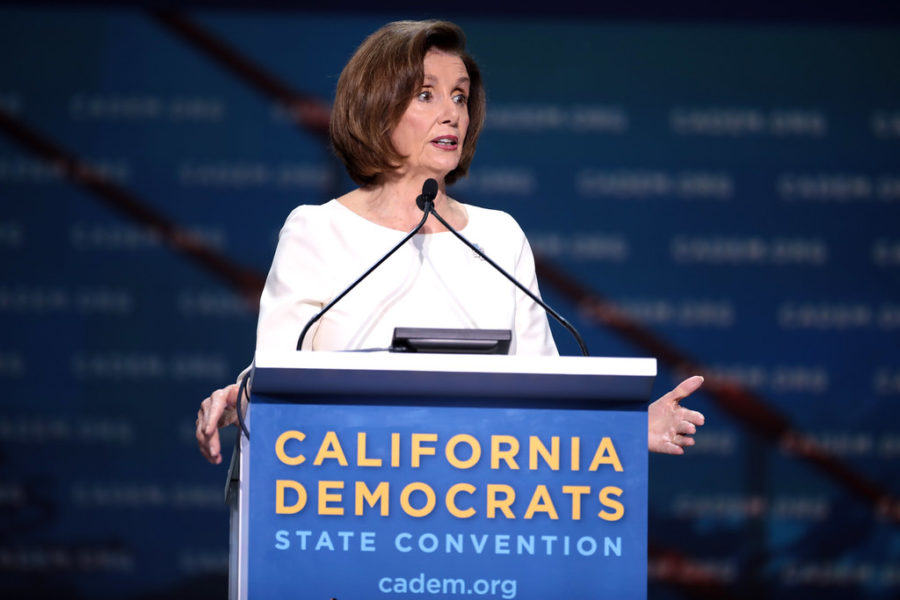Madam Speaker: Nancy Pelosi’s historic two decades leading the Democratic party
Photo used with permission from Google Creative Commons
Nancy Pelosi led Democrats in the House of Representatives for 20 years as arguably the most important and successful speaker in American history.
As the 118th Congress began, Nancy Pelosi stepped down from her position as leader of the House Democratic Caucus, a position she held for two decades. She was speaker of the house for eight of those years. Pelosi has had a storied career as arguably the most consequential and impactful speaker in American history.
While Pelosi was cast as a typical West Coast liberal by Republicans, she learned about government and politics more than 60 years ago in Maryland, as the daughter of Baltimore Mayor and Congressman Thomas D’Alesandro.
One of her first jobs in politics was interning for Maryland Senator Deniel Brewster, with future colleague and Steny Hoyer. After moving to California, Pelosi was elected as party chair for Northern California in 1977, and four years later was selected to head the California Democratic Party, which she led until 1983.
Thereafter, Pelosi served as the San Francisco Democratic National Convention Host Committee chairwoman in 1984, and then as Democratic Senatorial Campaign Committee finance chair from 1985 to 1986. She first won her congressional district in a 1987 special election. She quickly rose through the ranks of Democratic House leadership. One of her most notable battles against another Democrat was in 2001, where she earned the position of minority whip 118-95. After this election Hoyer said, “If she hadn’t been a woman or from California, I think we would have been OK.”
Despite this post-election bitterness, Pelosi and Hoyer would work with each other successfully over the next two decades. After a disappointing 2002 midterms, Pelosi rose to the leader of House Democrats. During George W. During Bush’s administration, Pelosi was able to work with him on some issues, but most notably was in fierce opposition to the Iraq War and Bush’s proposal to privatize social security. These issues, and a broader lack of approval for Bush, lead to a Democratic landslide in the 2006 midterms, making Pelosi the first ever female speaker of the house.
The economics of deregulation on Wall Street that began with President Ronald Reagan, continued with Presidents Clinton and Bush and lead to the Great Recession in 2008. Pelosi did not selfishly wield this crisis for partisan gain, and ensured there would be enough Democratic votes in the House to pass The Troubled Asset Relief Program (TARP) was important legislation in preventing the Great Recession from becoming a Depression.
The election of then-Senator Barack Obama in 2008 would usher in an incredibly productive two-year span. During this time, Pelosi passed the expansive 831 billion Recovery Act, which delivered immediate relief to the economy, provided jobs through infrastructure investments, increased educational funding, and provided assistance towards health care costs. Perhaps what aged the best about this legislation was the way in which it helped jumpstart the clean-energy economy with the largest government investments in renewable energy at that time.
In the wake of the Great Recession, reform on Wall Street was crucial, and the Dodd–Frank Wall Street Reform and Consumer Protection Act was the means to accomplish this. It outlawed much of the massive risk-taking behavior big banks took that caused the Great Recession. Again, Pelosi exhibited command over her caucus as it passed along party lines.
Another legislative accomplishment during this time was the repeal of the military “Don’t ask, Don’t tell” policy, in which the gay men and women who volunteered to serve their country were forced to hide their sexuality, and could be discharged if they mentioned it.
It may seem hard to picture in 2023, when a large majority of America approves of same-sex marriage, but same-sex marriage, and even relationships, were once extremely unpopular, even among the Democratic party. Eliminating “Don’t ask, Don’t tell” was a massive step toward then-Vice President Joe Biden declaring his support for same-sex marriage in 2012, followed by Obama. Eventually, in 2015, the Suprme Court would enshrine same-sex marriage as legal throughout the America.
Additionally, The Lilly Ledbetter Fair Pay Act of 2009 helped fight against pay discrimination on the basis of sex. It allowed individuals facing pay discrimination to seek rectification under federal anti-discrimination laws. While all of these pieces of legislation were significant enough on their own, the legacy of Obama’s presidency is inexorably tied to health care.
The passage of the Affordable Care Act was one of the most impressive political feats in modern history. There is plenty of credit to be given. Obama refused to give up after vociferous opposition from Republicans, the insurance industry, and even some in his own party. Biden, in concert with then-Senate Majority Leader Harry Reid, milked every last one of their personal relationships and connections to ensure this bill’s passage.
However difficult passage in the Senate was, senators are elected to six-year terms. They can afford to take more politically damaging votes, as they are more insulated from immediate public reaction. In the House, when every member is up for reelection every two years, there is constant fear of losing votes, not being able to fundraise enough, and the next opponent. In this chaotic environment, an unpopular (at the time) health care reform law would seem to be an impossible task. Not for Pelosi. At the nadir of negotiations, when some had settled on the idea of breaking this law up into smaller pieces, Pelosi stood strong.
This legendary leadership is best explained by Democratic Senator and former House member Chris Murphy: “There’s one night I will remember most when thinking about Nancy Pelosi – the night I watched her single handedly save health care for 20 million Americans. It was at the first Democratic caucus meeting after Scott Brown won the special Senate election in Massachusetts. Many rank-and-file Democrats were in a panic, and they lined up at the microphone to tell Pelosi that it was time for us to give up on the Affordable Care Act. I remember it like it was yesterday. Pelosi sat at the front of the room in the basement of the Capitol, and she listened politely to the calls for retreat. Even some of her most loyal progressive allies were begging her to ditch the ACA in the name of political expediency. And then, when everyone had spoken, she picked up a handheld microphone. I expected her to give into the calls to give up. But she didn’t. She did exactly the opposite. She told the room that there come times when leaders have a choice to make – stand up to the powerful status quo and change the world or give in to short term political expediency. This was our moment, she told us, to save lives and lift millions out of health care poverty. She told us that it was time for us to stiffen our spines and march forward. She told us the country was counting on us. I watched her single handedly WILL the caucus to act. I watched her mettle change the entire mood of the room. When she was done, no one challenged her. Two months later, Congress passed the Affordable Care Act. And today, it’s so popular the new Republican Congress won’t dare touch it. I had never seen any person do what Pelosi did that night. I’ve never seen it since. There hasn’t been, and will not be, anyone like her.”
As the 2018 midterms approached, former President Trump tried a familiar tactic – fabricating stories he knows would fire up his base. After ranting and raving about a supposed caravan of immigrants storming toward the southern border, Pelosi did not take the bait, and kept to the focus of the midterms on health care, and how the Republicans planned to strip healthcare from more than 20 million americans through repealing the ever-popular Affordable Care Act. The unpopularity of the Affordable Care Act in 2010 was one of the key reasons Democrats lost their House majority. In 2018 After eight long years in the House Minority, the Affordable Care Act, and the protection it gave to the most vulnerable, was a key reason why voters placed House Democrats back in the majority through a landslide national popular vote victory, gaining more than 40 seats in the House.
Pelosi would secure the speakership on the first ballot, what used to be routine before current speaker Kevin McCarthy’s whooping 15-ballot spectacle. Through two years, she would demonstrate her same leadership in a number of key moments. During an over month-long government shutdown that stemmed from Trump demanding his border wall, Pelosi refused to give in, and Trump would eventually cave.
She led two impeachments of Trump, another act of courage because, especially on the first impeachment, it was likely Trump would be acquitted before the proceedings even began. But Pelosi pushed ahead, knowing that the audience for these hearings would be history, not the Republicans too terrified of a tweet to see the facts in front of them.
According to Reuters, Pelosi also made her mark in foreign policy, visiting Ukraine, Iraq and Afghanistan. In August of 2022, she enraged China by becoming the highest-ranking American official in 25 years to visit Taiwan, saying she was honoring America’s “unwavering commitment” to the self-ruled island’s “vibrant democracy.” The visit capped decades of Pelosi’s high-profile opposition to China’s authoritarian rulers, including President Xi Jinping. Yet again, this is a view of Pelosis that has become more popular over time.
After the election of Biden in 2020, concerns over her age and calls for a new generation of leadership lead her to promise this would be her final term as Democratic leader. The mountain of important legislation passed during these two years includes the 036;2.2 trillion American Rescue Plan, which has led to the lowest unemployment rate since 1969. There was also the largest investment in infrastructure since the 1950s, and the largest investments in renewable energy in American history.
She has secured the passage of packages of military and humanitarian aid to Ukraine as they fight for their nation, and helped pass the first piece of gun control legislation in nearly three decades following the tragic Uvalde Elementary School shooting. She also presided over the passage of historic technological investments in research and development of new chip technology. What more, she did this with just a five-seat majority – the same size that has left the new Republican majority fractious and divided.
These incredible legislative achievements would have been enough to cap her stellar career, but after a historically great midterm election for the party in power , she would help pass a near year-long budget. Finally, she lead the passage of the Respect for Marriage act, protecting same-sex and interracial marriage by law, not just Supreme Court decision. This repealed a law that represented a cynical and mean-spirited election year calculator by the Clinton administration, which would be repeated by Bush in 2004. In that era, there were few better ways to boost one’s political standing than attacking gay people. Pelosi has helped end that era, and despite a climate of increased partisanship, and an impossibly small majority, shepherded the passage of a miraculous amount progressive legislation, exceeding even the wildest dreams of the 38,927 Californians who elected her to Congress 36 years ago.
Your donation will support the student journalists of Thomas S. Wootton High School. Your contribution will allow us to purchase equipment and cover our annual website hosting costs.
Ethan is a 2023 graduate.







